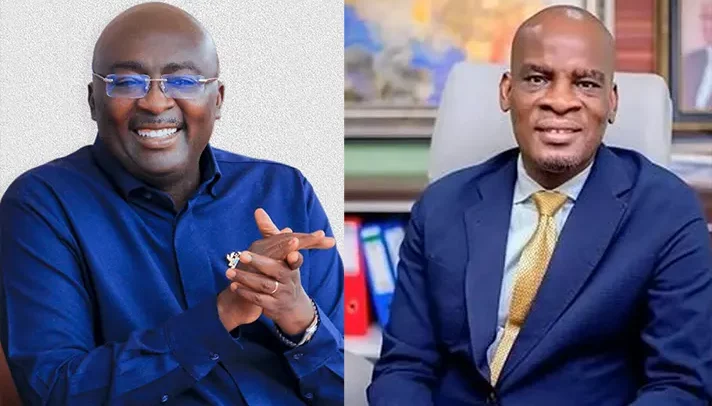Dr. Mahamudu Bawumia and Haruna Iddrisu
A new poll conducted by Global Info Analytics has pegged former Vice President, Dr. Mahamudu Bawumia and current Education Minister, Haruna Iddrisu as favourites to lead the New Patriotic Party (NPP) and the National Democratic Congress (NDC) into the 2028 general election.
According to the poll released yesterday, 57 percent of Ghanaians prefer former Vice President Dr. Mahamudu Bawumia, to lead the NPP into the 2028 general election while Haruna Iddrisu narrowly leads with 27 percent of voter preference for the NDC.
Bawumia’s Popularity
The poll, via the organisation’s official social media platforms, confirms Dr. Bawumia as the most popular candidate among the general electorate, leading his closest contender, former Assin Central Member of Parliament (MP) Kennedy Ohene Agyapong, who garnered 29 percent support.
According to the data, Dr. Bawumia enjoys a commanding lead across various regions, underscoring his broad national appeal. However, the survey also notes a recent dip in his support among NPP delegates, raising questions about internal party dynamics ahead of the flagbearer selection.
Other notable contenders trail far behind. Former Education Minister Dr. Yaw Osei Adutwum secured 6 percent, Food and Agriculture Minister Dr. Bryan Acheampong polled 5 percent while former NPP General Secretary Kwabena Agyepong received 3 percent support.
In key swing regions like Greater Accra, Central, and Western, Dr. Bawumia remains dominant, with 57 percent of respondents backing him, Kennedy Agyapong follows with 32 percent, with both Dr. Adutwum and Dr. Bryan Acheampong garnering 4 percent each, while Kwabena Agyepong obtained 3 percent.
The poll further explored a hypothetical runoff between Bawumia and Agyapong. In this head-to-head scenario, Bawumia extended his lead, winning 62 percent of the projected vote compared to Agyapong’s 38 percent.
Despite some slippage in support among party delegates, Agyapong has yet to capitalise. The survey suggests that the Vice President’s losses have not translated into significant gains for his closest rival. Instead, a notable portion of delegates appear to be moving into the undecided category.
According to some analysts, the poll reflect both Bawumia’s enduring popularity among the general public and growing uncertainty within the party’s internal structures. Global Info Analytics highlighted this divergence as a key issue as the NPP prepares for its 2028 flagbearer race.
Among NPP delegates, Dr. Bawumia still holds a clear lead with 47 percent, while Agyapong trails at 17 percent with Dr. Acheampong and Dr. Adutwum each securing 3 percent and 1 percent respectively, while Kwabena Agyepong also polled 1 percent.
It however emerged from the poll that a significant 27 percent of delegates remain undecided, while 4 percent declined to state their preference, adding that in a possible runoff among delegates, Bawumia’s support ticks up slightly to 49 percent, compared to Agyapong’s 19 percent, as 27 percent remain undecided, and 5 percent chose not to reveal their vote.
NDC’s Close Contest
In the race to succeed President John Dramani Mahama as leader of the National Democratic Congress, Mr. Iddrisu is followed closely by Asiedu Nketia at 26 percent, Dr. Ato Forson with 22 percent, while Chief of Staff, Julius Debrah, registers 11 percent.
The Foreign Affairs Minister, Samuel Okudzeto Ablakwa, polls at 8 percent, Dr. Zanetor Agyeman-Rawlings 4 percent, and other contenders share the remaining 3 percent.
The results reflect a surge for Mr. Asiedu Nketia compared to earlier April findings, while Mr. Haruna Iddrisu has managed to maintain his early advantage.
Among declared NDC voters, Mr. Iddrisu widens his lead slightly with 31 percent support, compared to Mr. Asiedu’s 24 percent and Dr. Ato Forson’s 22 percent. Messrs Julius Debrah, Ablakwa, and Dr. Zanetor all remain in single digits.
The poll also reveals how voting blocs break differently depending on party affiliation and past choices.
A majority of New Patriotic Party voters surveyed favour Asiedu Nketia (32 percent), with Haruna (22 percent) and Forson (20 percent) trailing.
Among those who voted for President John Mahama in the 2024 elections, Haruna Iddrisu draws 30 percent support, Dr. Ato Forson 24 percent, and Asiedu Nketia 22 percent. Ablakwa and Dr. Zanetor attract 8 percent and 3 percent respectively.
Among respondents who did not disclose their 2024 vote, Haruna maintains 30 percent backing, Forson 24 percent, and Asiedu 15 percent, while Debrah and Ablakwa poll 10 and 12 percent respectively.
Dr. Zanetor attracts 5 percent in this group. For those who did not vote in 2024, Asiedu leads with 23 percent, Haruna secures 19 percent, and Forson and Debrah both stand at 18 percent. Ablakwa draws 15 percent, while Dr. Zanetor garners 5 percent.
When narrowed to core NDC voters who backed Mahama in 2024, Haruna’s dominance is clearer – 31 percent to Forson’s 24 percent and Asiedu’s 22 percent.
However, among NDC voters who did not disclose their 2024 preference, Forson and Ablakwa perform better, drawing 18 and 13 percent respectively, compared to Haruna’s 24 percent and Asiedu’s 16 percent.
Among NDC voters who abstained in 2024, Haruna commands 28 percent, Asiedu 26 percent, while Debrah rises to 19 percent.
Beyond personalities, the poll also measured overall party attractiveness. It found that the NDC continues to gain ground nationally, with 44 percent of voters openly identifying with the party, which represents an increase from 42 percent in April 2025.
By contrast, the NPP’s support has slipped, now standing at 30 percent, down from 32 percent in April.
The survey covered 10,493 respondents across 84 constituencies through a combination of online, telephone, and in-person interviews conducted between May and June 2025. The overall margin of error is estimated at ±1.23 percent with a 99 percent confidence level.
Taken together, the findings suggest that while Haruna Iddrisu retains a narrow overall lead, Asiedu Nketia’s recent surge and Ato Forson’s steady showing among Mahama loyalists make the NDC’s succession race far from settled.
By Ernest Kofi Adu & Ebenezer K. Amponsah


